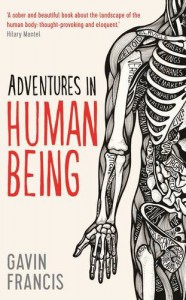127
Followers
155
Following
Bettie's Books
A Stuga On the Cusp of the Orust Riviera, tucked away next to a hobbit hole in the woods.
Adventures in Human Being by Gavin Francis

bookshelves: summer-2015, radio-4, nonfiction, medical-eew, published-2015, sciences
Recommended for: BBC Radio Listeners
Read from June 05 to 12, 2015
 BOTW
BOTW http://www.bbc.co.uk/programmes/b05xd44c
http://www.bbc.co.uk/programmes/b05xd44cDescription: Gavin Francis leads us round a cultural map of the body - an adventure in what it means to be human. Taking in health and illness, and offering insights on everything from the ribbed surface of the brain to the unique engineering of the foot.
Drawing on his own experiences as a physician and writer, he blends first-hand case studies with reflections on the way the body has been imagined and portrayed over millennia.
 1/5: Gavin begins with the moment, age 19, when he first held a human brain.
1/5: Gavin begins with the moment, age 19, when he first held a human brain. 2/5: Francis has dissected many human faces during medical training, and as a demonstrator of anatomy, but he has never lost the sense of privilege that doing so brings. Our faces are key to our human identity - when faces are available, we pay more attention to them than to any part of the visual world. When our ability to use our facial muscles to convey our emotions is harmed, as in Bell's palsy, it can be socially devastating. But even when a face is damaged, it's still vital to our sense of self.
2/5: Francis has dissected many human faces during medical training, and as a demonstrator of anatomy, but he has never lost the sense of privilege that doing so brings. Our faces are key to our human identity - when faces are available, we pay more attention to them than to any part of the visual world. When our ability to use our facial muscles to convey our emotions is harmed, as in Bell's palsy, it can be socially devastating. But even when a face is damaged, it's still vital to our sense of self. 3/5: A serious motorbike crash brings a young soldier to A&E with a badly injured shoulder. His arm is paralysed, and may not recover.
3/5: A serious motorbike crash brings a young soldier to A&E with a badly injured shoulder. His arm is paralysed, and may not recover.Since Homer wrote the Iliad almost three thousand years ago, military strategists have understood the power of wounds to the brachial plexus, the network of nerves behind our collarbones. Our 'arms' are both parts of our body, and weapons of war.
 4/5: The liver is a mysterious organ - essential to life, multifarious in its actions, its tissue unusual in being able to regenerate.
4/5: The liver is a mysterious organ - essential to life, multifarious in its actions, its tissue unusual in being able to regenerate.Ancient cultures used the livers of sacrificed animals to predict events; Biblical kings planned wars according to what the liver foretold. Livers appear in the proverbs of eastern Europe and in the folk tales gathered by the Brothers Grimm. And when a young gardener scratches her finger on a thorn and falls into a coma, it might be her liver which saves her life.
 5/5: His journey ends at the foot - a marvel of engineering often overlooked by anatomists and medical students.
5/5: His journey ends at the foot - a marvel of engineering often overlooked by anatomists and medical students.It's thanks to the arches of our feet that we stepped into our humanity more than two million years ago.
Read by Bill Paterson
 8
8


